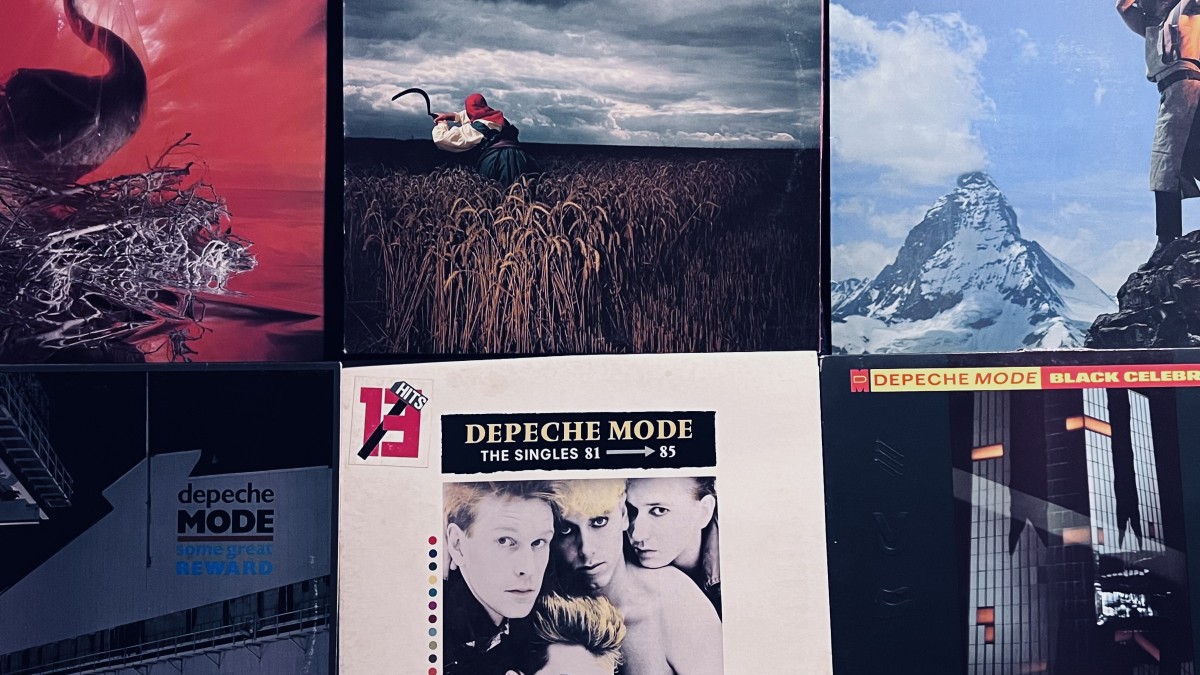A few years ago my Dad came back from the car boot with a pile of eighties pop albums: some Eurythmics, a few Pet Shop Boys and five early Depeche Mode studio albums (with a singles compilation as well).
So I thought, why not listen to them and then write a brief review of each? That would be great!
I’d first come across DM at a Belgian rock festival in 2013, then a few years later liked their singles on the Top of the Pops repeats; so this little writing effort would be a nice way of getting into their body of work.
However, this creative challenge has proved to be something quite hard to get going with. I’ve listened to most of the five albums repeatedly, have enjoyed their melodic, poppy charms and appreciated their minor flaws, but I still am unable to figure out what it is that I can say about them. But I refuse to scrub out Depeche Mode Album Review from my list of personal projects…
Speak and Spell (1981)
Vince Clarke’s single album at the helm of the band is a typically bold and upbeat work. Most of the album’s appeal comes from the energy of the synth melodies. The music is awash with optimism although the lyrics and mood is often darker (Puppets, Sometimes I Wish I Was Dead, Martin Gore’s two contributions on side two). A punky aggression is also manifested through the bovver boy energy of the excellent Boys Say Go!. The album is topped and tailed by the band’s two first hit singles, New Life and their signature piece Just Can’t Get Enough.
A Broken Frame (1982)
With Clarke gone, a three-piece DM returned with this rather good second album. The edgy yet buoyant opener Leave in Silence, one of my favourite singles of theirs, starts off proceedings well. See You is another fine single; although follow up The Meaning of Love is (for me) the weakest of their eighties efforts. The album treads an atmospheric path split between melodic songs (My Secret Garden, A Photograph of You, The Sun and the Rainfall) and slow, moody downbeat pieces (Monument, Shouldn’t Have Done That). Gore’s callow lyrics aren’t a strength but the band have a sense of ambition and a frothy energy here.
Construction Time Again (1983)
A mixed affair this time – again, the singles are terrific: the reflective and textured Love in Itself and the euphoric classic Everything Counts. Again, the band move their sound forwards to their credit, but too many of the tracks are either too busy, somewhat gauche or just a bit tedious.
Some Great Reward (1984)
DM are moving themselves towards refining a style: gothic and industrial and with a tortured, emotive take on human affairs and sexual politics. The opener is a hangover from the previous album, but Lie to Me is the first song that resembles their prime a few years ahead. Martin Gore’s vocal presence is also fully established here with the two love songs (Somebody and It Doesn’t Matter), while Dave Gahan’s presence and power is increasing all the time. The singles are again spectacular.
Black Celebration (1986)
DM’s development finally culminates in this, their first album which is very good. Gore’s forbidding mood and atmospherics, Gahan’s charismatic vocals and Alan Wilder’s dense arrangements gives the piece a dynamic and doomy presence. The album is very well sequenced: the title track and the particularly morbid Fly On the Windscreen lay down the tone, with a trio of slow pieces to follow. The singles – Stripped is a standout even for this brilliant singles band – are here clustered towards the centre. Black Celebration feels like DM reaching the point of maturity.

